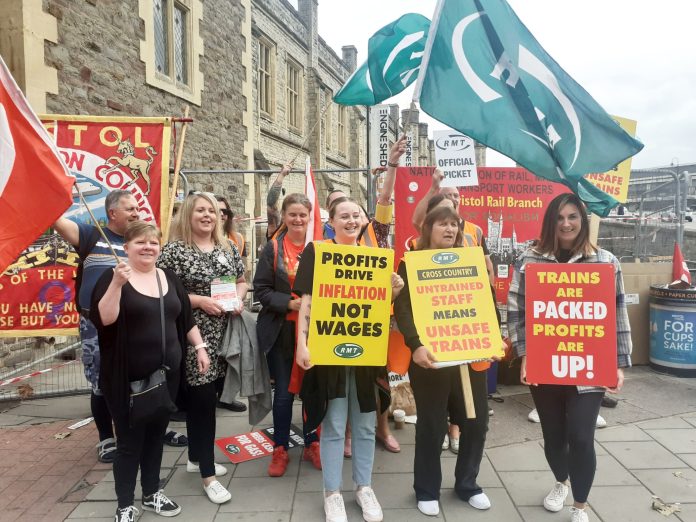Socialist Party members in the RMT
As we open our Annual General Meeting (AGM – the union’s conference), our members in the Train Operating Companies (TOCs) have been in dispute for over a year.
Our members have shown again and again that they are prepared to do whatever it takes to defend jobs and our precious terms and conditions.
TOCs
In the latest reballot, members at the 14 TOCs returned huge ‘yes’ votes with Cross Country trains and Avanti members leading the way at over 95%. This is despite Network Rail members’ acceptance of an offer that removed those members from further strike action in the current dispute.
If these incredible mandates are to result in a successful campaign to push the employers back and deliver an offer our members deserve, then we must go beyond staying in the fight, and adopt a strategy to win.
This means calling a fresh series of dates for strike action, united across the TOCs, and coordinating with our sister unions on the railways.
It is very positive that Mick Lynch is seeking to organise a joint meeting of the executive committees of RMT and Aslef, something Socialist Party members have campaigned for. Members of both unions should put pressure on their reps and officials to ensure that this happens.
Our campaign over the last year has delivered a slight improvement in the pay offer and the apparent shelving of some of the very worst attacks.
But it needs to be said that the odd day of strike action will not and cannot put sufficient pressure on the employers to concede to our demands, and risks allowing the resolve and determination of our members to dissipate over time.
We need an escalation of the campaign within the union itself in order to reconvince the reps and wider membership that it is possible for us to drive back the employers. Branches and regional councils should be holding special meetings to inform and update members. This needs to be done in conjunction with adopting a strategy to win.
Moves towards generalised strike action are not the only action we should take but the government fears a generalised movement and so we must do we all we can to build one. That means RMT raising the need for coordinating days of strike action wherever trade unions are in dispute, such as in the NHS and other public sector services.
Defend jobs, pensions and agreements on London Underground
Six days of all-grades strikes, and another day by station grades, has pushed back attempts by the Labour London mayor Sadiq Khan and the Tory government to attack pensions on London Underground. However, the bosses are pushing ahead with job cuts, around 10% across stations and trains, with engineering reorganisations also threatened, and demands for flexible working.
We have taken pre-emptive action on the tube. That is, we have put demands on Transport for London to rule out attacks, and then taken action when those assurances have not been given.
The cuts agenda is now gathering pace. Action on the tube is sometimes taken separately to the TOC dispute. On London Underground we have over 10,000 members, and the cuts proposed amount to around half of the total cuts across the UK rail industry.
But the only way to win our demands in full is to win back from the government an operating subsidy of around £1 billion a year. To achieve this, we want to be part of a bigger, generalised fight across the trade union movement.
That’s why this issue, how RMT can act as a lever on the whole movement, is now the most important issue facing our union.
Minimum service law must be defeated
The TUC’s response to the Tories latest anti-strike bill has been hopelessly inadequate. No national demo, no ‘council of war’. RMT should approach other unions, especially those currently taking strike action, and seek a coordinated fightback and commitment to support each other in the event that the laws are used against us.
We should also publicly demand that any local, regional or national authority not run by the Tories commits not to issue a work notice to its workers. There is nothing in the legislation to compel any Labour council, mayor, or the Scottish or Welsh governments to demand a minimum service level in the event of a strike. All possible pressure must be put on them to refuse.
Time to review RMT political strategy
Sir Keir Starmer has been rapidly eliminating any remaining policies from the Corbyn era. Jeremy himself is no longer allowed to stand as a Labour MP and Corbyn-supporting Tyne and Wear Metro Mayor Jamie Driscoll has now been undemocratically blocked from standing by the Labour leadership.
Meanwhile, Merseyside’s Labour mayor Steve Rotheram oversaw the wholesale degradation of RMT members’ jobs on Merseyrail, and Sadiq Khan leads Transport for London, attempting to drive through the ‘managed decline’ of public transport in London.
Socialist Party members support the emergency resolution going to RMT’s AGM calling for the union’s current political strategy to be reviewed: “Our 2018 SGM took the decision to align RMT’s political strategy to the Labour Party, while remaining unaffiliated. Developments since the election of Starmer call into question whether Labour does align with the aims, objectives and policies of our union.”
We support the call to launch a consultation among the membership, before holding a Special General Meeting to decide on a new political strategy that is appropriate for the current situation.
Massive Aslef vote
Members of the Aslef train drivers union have delivered a massive response to the employers’ shoddy offers in the reballot demanded by Tory anti-strike laws.
In only one company was the vote to strike under 90% – and that was 86%.
Turnouts in the 12 Train Operating Companies that were balloted all smashed through the Tory anti-democratic turnout thresholds, ranging from 68.75% to 90.91%!







